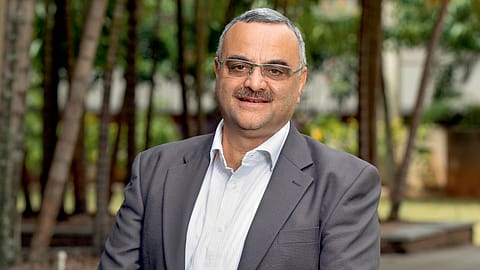Timken India’s Innovation Engine
Sanjay Koul leveraged technology and process improvements to deliver the best financials since Timken India’s inception.

This story belongs to the Fortune India Magazine October 2022 issue.
I KEEP TELLING people that the Timken company believes in Saraswati; Lakshmi is a by-product,” says Sanjay Koul, chairman and managing director, Timken India, a maker of engineered bearings and power transmission products. The evocation of the Hindu goddesses of knowledge and wealth underscores belief in innovative technologies as the cornerstone of Timken’s business in India. “We have always adopted cutting-edge technologies, whether it is material science or advanced machining, application and customer engineering, which is particularly important as the world is changing. This change will happen only when technology companies are a step ahead,” he says.
The Indian arm of the North Canton, Ohio-based company reported revenues of ₹2,203 crore in FY22, its highest ever, as operations touched pre-pandemic levels. The ₹327 crore PAT was also the highest ever. “Covid-19 and supply-chain disruptions have been looming large, but consumption in India has been decent since the initial days of the pandemic. Our customers have started to keep a lot more inventories to avoid disruptions. On average, rise in inventory of finished goods has been about 20% more than normal. This has pushed our order book,” he says.
But the pandemic spared no one. Timken India had to halt production for a couple of months in 2020 and a month in 2021. Even though it was able to deliver a profit in pandemic-marred FY21, operating profit margin fell to 14%, from 19% in FY2020, primarily due to rise in prices of inputs.
Koul calls past two years as ‘volatile’ — from excesses of the pandemic to spike in commodity prices that was passed on to original equipment makers (OEMs), something which, he says, had never happened in three decades of Timken’s presence in India. “Steel prices have gone up by 30-40% since the start of the pandemic. The pass-on happened without pushback, which benefitted the supply chain. But all price increases could not be passed on. There was mutual sharing of the burden,” he says. In FY22, the company was able to hold margins at 21-22% for the better part of the year despite fluctuations in commodity prices induced by Russia-Ukraine war, and ended the year with operating profit margin of 20%.
Not just Timken. Other manufacturing companies in India were also able to stay nimble during the period. Koul credits the government for this. “Government management was fantastic. Transportation of goods was flawless. We were able to operate the plants within our comfort zone. We even ran night shifts,” he says.
With rising input costs becoming a reality due to sharp increase in commodity prices, Timken is focusing on eliminating waste from its manufacturing processes. “We use a lean enterprise model right from melting of steel, which is the first step, to shipping of finished bearings,” he says.
Timken reduced costs by redesigning the transportation model and bringing down the distance travelled by inputs. “We could bring down kilometres travelled for our steel and work in process material by 10-25%.” Koul says the company can further curtail costs by improving transportation processes. “We have supply-chain hubs which ensure that transportation waste is minimised along with inventory/travel costs and time,” he adds. These efforts are being supplemented by creation of a localised supply chain.
More Stories from this Issue
With roads becoming better, Koul expects use of heavier and more long-haul trucks, which will help his company get more business. “I see big trucks, 100 HP, for instance, with more axles plying on roads becoming a common sight,” he says. These heavy axles will have to be technologically advanced, which is good news for Timken as innovation is its strong suit.
Brokerages are positive about Timken India’s growth prospects. “Timken’s revenue break-up is 75% from domestic sales and 25% from exports. It has a strong balance sheet and decent growth prospects led by railway, wind and export segments,” says an ICICI Securities report. The report highlights recovery in economy led by mining and industrial segments, strong capex cycle and traction from wind and services segments.
Consolidation is the key to increasing capacity for a manufacturing company like Timken. That is why it acquired ABC Bearings in 2018. “We needed those capacities. However, one needs to divide these capacities between large bearings and small bearings,” he says, adding that over the last two years, large bearings’ make-to-order period was between one and two years, whereas in small bearings, capacities were under-utilised.
Koul believes Centre’s infrastructure push will spur demand for commercial and off-highway vehicles. “Commercial vehicle is an important segment for us in India. This year is expected to be a breakout year for this segment, which is good news for us,” he says. The off-highway market — which includes cranes, earthmovers, excavators and agricultural equipment — is also expected to gain from infrastructure creation. Another area identified for growth is export of gearboxes for wind turbines.
(INR CR)
Next, Timken eyes railways’ growth plans. “The Indian government wants to build more wagons for freight trains it wants to run in freight corridors, along with high-speed trains and electric locomotives. Mass rapid systems like metros, which are coming up in most major cities, also require a lot of bearings, which is good news for us,” he says. According to Koul, the railways have tendered 90,000 wagons for the next three years, giving Timken India an opportunity to supply 7,20,000 bearings. In FY22, railways had accounted for 18-20% revenue. Koul has pinned great hopes on expansion of Indian infrastructure.